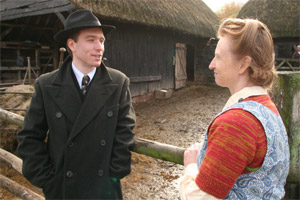Wartime Farm
York historian helps bring the 1940s to life
For University of York historian Dr Mark Roodhouse, working as an adviser on the new BBC2 documentary Wartime Farm brought some very intriguing revelations.
 Not least that ‘washing’ red petrol through bread really could have removed the dye added to stop thieves stealing petrol in wartime Britain.
Not least that ‘washing’ red petrol through bread really could have removed the dye added to stop thieves stealing petrol in wartime Britain.
Dr Roodhouse says: “The authorities dyed petrol to deter thieves from stealing military or local government supplies during the war. This was expanded to include farmers and other commercial users after the war – the forerunner of red diesel.
“With petrol rationed, there was a strong incentive for thieves to find ways to remove this dye. I’d come across three plausible methods during my research: filtering the petrol through charcoal, dissolving aspirin in the petrol and filtering the petrol through bread. The last was common knowledge, but struck me and the Ministry of Fuel and Power as deeply unlikely. To my delight, the bread method worked. A wholemeal bread being preferred. For me it was an object lesson to pay closer attention to old wives’ tales.”
The new eight-part BBC/Open University production Wartime Farm tells the story of British agriculture during the Second World War, focusing on food production and rations. Before the start of the war, Britain relied heavily on foreign food, but by the end, the situation had been transformed. Many of the farming methods used in Britain today are still shaped by our wartime past.
The new production is the latest in the BBC’s historic farming series which started with Victorian Farm in 2009, followed by Edwardian Farm in 2011. In Wartime Farm, historian Ruth Goodman and archaeologists Alex Langlands and Peter Ginn take on the challenge of running Manor Farm exactly as it would have been during the Second World War.
Dr Roodhouse not only advised on the series but makes an appearance on screen in the second episode aired on Thursday, 13 September.
I’ve long admired the series due to the programme makers’ commitment to communicating a vision of Britain’s rural past rooted in the latest research to the widest possible audience
Dr Mark Roodhouse
“When approached by producers Lion TV to contribute to Wartime Farm, I leapt at the opportunity,” says Dr Roodhouse. “I’ve long admired the series due to the programme makers’ commitment to communicating a vision of Britain’s rural past rooted in the latest research to the widest possible audience.
“I was also keen to share the findings of my publicly-funded Arts and Humanities Research Council (AHRC) research into black markets with people beyond the academy. This was a golden opportunity to take my work to a much larger audience.”
Dr Roodhouse admits that donning period costume and visiting the farm was also a draw. “I’ve written about gangster chic, but never had the opportunity to wear an ‘American Look’ suit from the 1940s!” he says.
But dressing up aside, he says he relished the opportunity to try some ‘experimental history’. “I’ve written extensively about the ways butchers could make more money by selling cheap cuts as premium cuts through careful cutting,” says Dr Roodhouse. “Having helped butcher a pig on a friend’s farm I had some idea how this might work, but seeing a skilled butcher conjure a little extra from a side of meat was a revelation, confirming much that I’d thought.”
Dr Roodhouse can be seen in Wartime Farm on BBC iPlayer.
Further information
- Dr Mark Roodhouse’s book Black Market Britain: 1939-1955 will be published by Oxford University Press in March 2013.
- Dr Roodhouse’s article ‘In Racket Town: Gangster Chic in Austerity Britain’ can be viewed at www.tandfonline.com/doi/abs/10.1080/01439685.2011.620846
- Department of History
- Arts and Humanities Research Council (AHRC)
